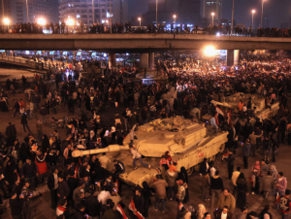|
World Jewish News

Photo by John Moore/Getty Images
|
Egypt will maintain its peace treaty with Israel, military says
13.02.2011, Israel and the World Egypt's ruling military reassured its international allies Saturday that there would be no break in its peace deal with Israel following the ouster of President Hosni Mubarak, and it lay out the first tentative steps to keep Egypt's economy and state functioning while it figures out how to overhaul the country for greater democracy.
The military statement, aired on state TV, was its first, cautious attempt to define the next steps after Mubarak handed over power to a council of his top generals and resigned on Friday in the face of an 18-day wave of popular protests.
The preserving of Mubarak's last government was likely to disappoint protesters, thousands of whom remain in their camp in Cairo's central Tahrir Square. Many of them have demanded more dramatic steps like the dissolving of parliament and the scrapping of the current government to form a broader-based transitional body to oversee reforms until elections can be held.
The military's statement did not rule out these steps might still be carried out.
A spokesman for the Armed Forces Supreme Council underlined the military's "commitment to all Egypt's international treaties."
Israel has been deeply concerned that Egypt's turmoil could threaten the 1979 peace accord signed between the two countries. The United States, Egypt's top ally, is also eager to ensure the accord remains in place. The military strongly supports the accord, not in small part because it guarantees U.S. aid for the armed forces, currently running at $1.3 billion a year.
Anti-Israeli feeling is strong in Egypt, and many of the hundreds of thousands of protesters expressed anger at Mubarak's close cooperation with Israel on a range of issues. Still, few seriously call for the abrogation of the treaty, realizing the international impact.
The spokesman, Gen. Yahya el-Fangari, asked the public, particularly the millions in the government sector, to "work to push the economy forward," a call for the economy to keep running after the disturbances of the past three weeks.
The military also called on the current government and provincial governors to continue their activities until a new government is formed, el-Fangari said.
The military is "looking forward to a peaceful transition, for a free democratic system, to permit an elected civil authority to be in charge of the country, to build a democratic free nation," he said.
The statement left unanswered the key question of how long the current government would stay in place: Whether it would continue on a longer term until a new one is elected, or whether the military intended it only as a stop-gap to keep the state functioning until it appoints a transitional leadership.
Haaretz.com
|
|
